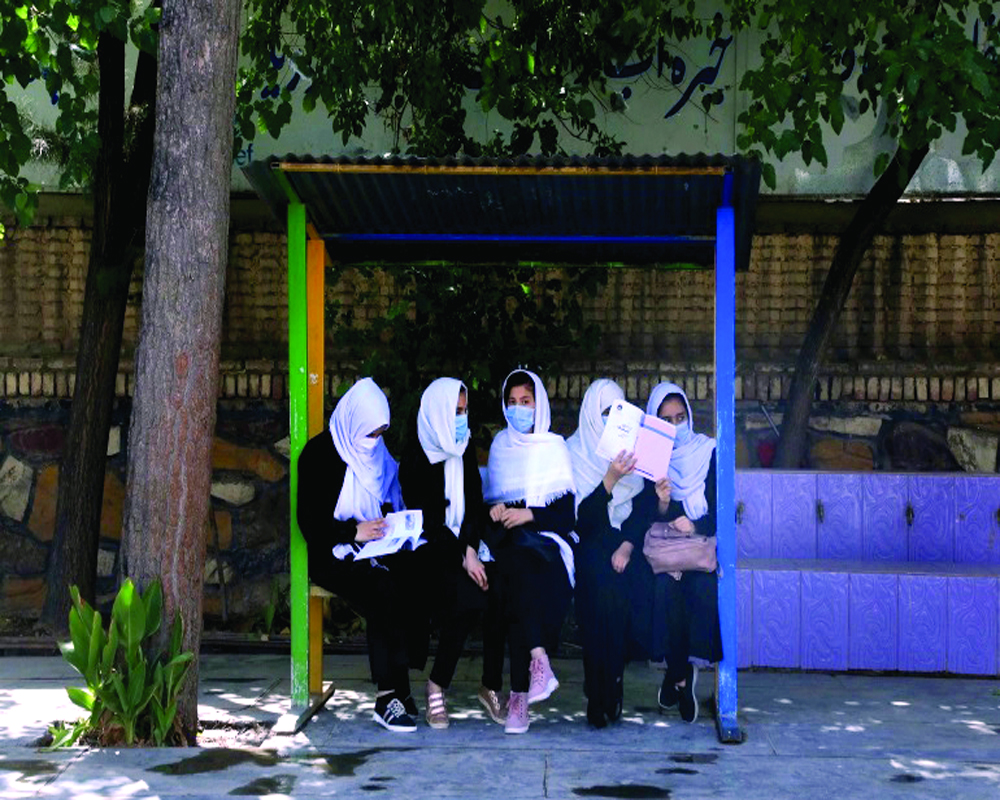Won’t attend classes till schools for girls reopen
In a country that has seen the human rights of women being trampled ever since the Taliban came to power in Afghanistan, there is a sliver of hope that there is still some resistance left in the people of the embattled country. This resistance to the regressive ways of the Taliban has come from a group of Afghan boys who have refrained from going to school in solidarity with the girls of the country who have not yet been recalled to school.
This startling development comes at a time when women employees in the Kabul city Government have been told to stay home, with work only allowed for those who cannot be replaced by men. This announcement detailing the latest restrictions on women by the new Taliban rulers, was made by the interim Mayor of Afghanistan’s capital on Sunday.
While most of the boys went to school, some boys stayed home to express solidarity with the girls and said that they wouldn’t show up until the schools for girls were opened.
“Women make up half of society … I won’t show up at school until the girls’ school opens,” Rohullah, an 18-year-old student in class 12, reportedly told the Wall Street Journal.
The Taliban Ministry of Education had on Friday ordered the reopening of secondary school for boys while the reopening of girls’ schools was still a mystery. “All male teachers and students should attend an educational institution,” said a statement released late on Friday.
Taliban spokesman Zabihullah Mujahid told the local Bakhtar News Agency on Saturday that an arrangement was underway to reopen girls’ secondary school, but he did not give a date.
Meanwhile, the United Nations has stated that it is “deeply concerned” about the future of girls’ school education in Afghanistan. “It is important that all girls, including older girls, be able to resume education without further delay. To do so, female teachers need to resume education,” he said.
The Taliban said it would not implement fundamentalist policies like the last rule, but the future of women’s rights and freedoms in Afghanistan remains questionable.
The decision to prevent most female city workers from returning to their jobs is another sign that the Taliban, who overran Kabul last month, are enforcing their harsh interpretation of Islam despite initial promises by some that they would be tolerant and inclusive.
In their previous rule in the 1990s, the Taliban had barred girls and women from schools, jobs and public life. In recent days, the new Taliban government issued several decrees rolling back the rights of girls and women. It told female middle and high school students that they could not return to school for the time being, while boys in those grades resumed studies this weekend.
Female university students were informed that studies would take place in gender-segregated settings from now on, and that they must abide by a strict Islamic dress code. Under the US-backed Government deposed by the Taliban, university studies had been co-ed, for the most part.
On Friday, the Taliban shut down the Women’s Affairs Ministry, replacing it with a Ministry for the “propagation of virtue and the prevention of vice” and tasked with enforcing Islamic law.
On Sunday, just over a dozen women staged a protest outside the Ministry, holding up signs calling for the participation of women in public life. “A society in which women are not active is (sic) dead society,” one sign read.
“Why are they (the Taliban) taking our rights?” said one of the protesters, 30-year-old Basira Tawana. “We are here for our rights and the rights of our daughters.”
The protest lasted for about ten minutes. After a short verbal confrontation with a man, the women got into cars and left, as Taliban in two cars observed from nearby. Over the past months, Taliban fighters had broken up several women’s protests by force.
Elsewhere in the city, interim Kabul Mayor Hamdullah Namony gave his first news conference since being appointed by the Taliban.
He said that before the Taliban takeover last month, just under one-third of close to 3,000 city employees were women, and that they had worked in all departments.
Namony said the female employees have been ordered to stay home, pending a further decision. He said exceptions were made for women who could not be replaced by men, including some in the design and engineering departments and the attendants of public toilets for women. Namony did not say how many female employees were forced to stay home.
“There are some areas that men can’t do it, we have to ask our female staff to fulfill their duties, there is no alternative for it,” he said.


























